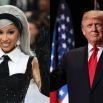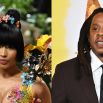Sampling and hip-hop have gone hand in hand for decades, for better or for worse. For every Robert Fripp, the guitarist in charge of King Crimson who loved Kanye West's sample of "21st Century Schizoid Man" during "Power," there are groups like The Winstons, who don't appreciate that the "amen break" from its hit "Amen, Brother" has been borrowed literally thousands of times. The battles over creative copyright and kickbacks have been ongoing for years, but a new study suggests that the practice actually boosts the sales of the work sampled.
W. Michael Schuster, author of the report Fair Use, Girl Talk, and Digital Sampling: An Empirical Study of Music for Copyrighted Works, went right to one of the densest collections of samples in the history of music: Girl Talk's 2010 LP All Day. The DJ has made a career of producing "mashups," tracks that combine numerous preexisting tracks into a musical gumbo. Day features more than 350 unique samples.
Schuster traced each sample, and how well the tracks they were derived from sold during 2010 and 2011. According to his findings, there was a 92.5 percent "degree of statistical significance," suggesting that more than 90 percent of the tracks involved saw an increase in sales during the year following All Day's release. One track seeing an increase may be luck, but 90 percent seeing download boosts suggests a stronger correlation.
This doesn't quite solve the sampling issue yet. Although artists may see a jump in cash flow thanks to downloads of sampled songs, it may not be as much as they would get from contractually earning a cut of the sampler's sales. Also, Girl Talk is a fairly big name that reaches many listeners. If a smaller, less renowned artist samples jazz musician Jimmy Smith's "I'm Gonna Love You Just A Little Bit More Babe," it's less likely to get listens and therefore less likely to earn the Smith estate kickbacks.
The debate will live on as long as the practice itself, it seems.
© 2025 MusicTimes.com All rights reserved. Do not reproduce without permission.




